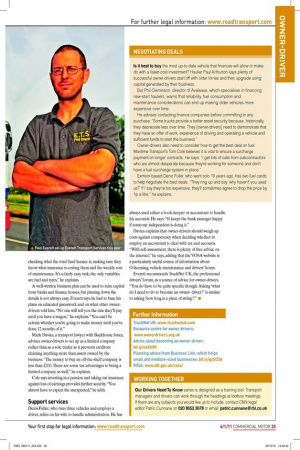NEGOTIATING DEALS
Page 21

If you've noticed an error in this article please click here to report it so we can fix it.
Is it best to buy the most up-to-date vehicle that finances will allow or make do with a lower-cost investment? Haulier Paul Arthurton says plenty of successful owner-drivers start off with older lorries and then upgrade using capital generated by their business.
But Phil Cleminson, director of Avelease, which specialises in financing new-start hauliers, warns that reliability, fuel consumption and maintenance considerations can end up making older vehicles more expensive over time.
He advises contacting finance companies before committing to any purchase: “Some trucks provide a better asset security because, historically, they depreciate less over time. They [owner-drivers] need to demonstrate that they have an offer of work, experience of driving and operating a vehicle and sufficient funds to start the business.” Owner-drivers also need to consider how to get the best deal on fuel. Maritime Transport’s Tom Cole believes it is vital to ensure a surcharge payment on longer contracts. He says: “I get lots of calls from subcontractors who are almost desperate because they’re working for someone and don’t have a fuel surcharge system in place.” Exmoor-based Denis Fuller, who went solo 10 years ago, has two fuel cards to help negotiate the best deals. “They ring up and say ‘why haven’t you used us?’ If I say they’re too expensive, they’ll sometimes agree to drop the price by 1p a litre,” he explains.














































